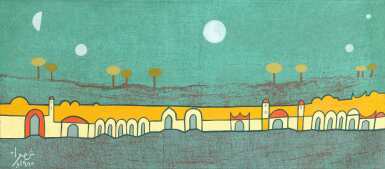Modern & Contemporary South Asian Art
Modern & Contemporary South Asian Art

Property from a Private Collection, Cumbria
Anwar Jalal Shemza
City Wall
Auction Closed
September 26, 03:20 PM GMT
Estimate
16,000 - 22,000 GBP
Lot Details
Description
Property from a Private Collection, Cumbria
Anwar Jalal Shemza
1928 - 1985
City Wall
Gouache on paper laid on card
Signed and dated in Urdu lower left and further signed, dated and inscribed on reverse of card: ‘Shemza/ / 1980 / 290 x 490’
17.9 x 41.4 cm. (7 x 16 ¼ in.)
Painted in 1980
Estate of the Artist
Acquired from the above by a former student of the artist, 1992
Gifted from the above, 1994
Anwar Jalal Shemza studied at the Mayo School of Art (now National College of Art) in Lahore in 1944, learning miniature painting among other techniques. A talented writer and artist, Shemza published several short novels in the 1950s, edited an Urdu literary journal and ran a graphic studio. Later, he moved to the United Kingdom to study at the Slade School of Art, London where he began to receive critical attention for his artwork. Showing alongside Francis Newton Souza and Avinash Chandra at Victor Musgrave’s influential Gallery One in London in 1960, Shemza was an active and well-respected member of the arts community, featuring at the Gulbenkian Museum in Durham in 1963 and the Ashmolean Museum in Oxford in 1964.
Shemza typically explored Roman letters, Arabic and Persian calligraphic designs in his artwork. Painted in 1980, the current lot is a rare landscape which incorporates the the geometric arrangements of Shemza's abstract works and charming naturalistic touches. The work reveals a moonlit city wall stretching across a hillside. The horizon line is topped by stylized trees, above which hang moon-like orbs and a semi-circle. The aquamarine hue of the backdrop lends a dusky haze to the scene, and beautifully counters the saturated warm hues of the architectural features. The present lot shares its name with the iconic oil on board work from 1960, the current world auction record for the artist. Whereas the latter work shows Shemza's idiosyncratic calligraphic patterning, the present City Wall possesses elements of the natural world not often seen in the artist's oeuvre.
You May Also Like










